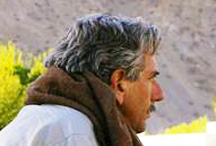 Robert Abdul Hayy Darr speaks on how appearances and the nurturing of appearances often carry the day. He opens with a Mullah Nasreddin story and explores deeply why it is that we are constantly feeding the various and differing personas that we have learned to take on not only as vestments, but also to inhabit so completely that we may not remember who we really are. His hope is that we may inhabit that sacred level of body and heart that makes us fly on the Buraq of love into the Heaven of Divine Love, that it take us on high to the heavens and guide us to our original self.
Robert Abdul Hayy Darr speaks on how appearances and the nurturing of appearances often carry the day. He opens with a Mullah Nasreddin story and explores deeply why it is that we are constantly feeding the various and differing personas that we have learned to take on not only as vestments, but also to inhabit so completely that we may not remember who we really are. His hope is that we may inhabit that sacred level of body and heart that makes us fly on the Buraq of love into the Heaven of Divine Love, that it take us on high to the heavens and guide us to our original self.
He defines Haqq and explains the need to assess what makes up our relationship to Haqq, and the actuality of becoming authentic. In Islam and the Sufi tradition authentic means being true to what you always have been, to the fitra, to where you are from and to where you are going. Each of us and each of everything is in a special relationship to the Authentic. Each person’s in-authenticity can only be a deviation from that particular person’s relationship with Reality.
People are often in a state of being in the self that incites to what is untrue, dark, and evil. What is evil is what is patently inauthentic to the point of causing destruction to any signs of the Authentic around it. We are encouraged to look at the life of the Prophet Muhammad for guidance on how to authenticate in different domains of life simultaneously. That is called integration.
We learn that more heart collectedness occurs while being in the company of others than in being secluded. Attaining to the Divine Presence on the Sufi path is different from the approach of other paths, where retreats and seclusions instead of socializing are thought to increase one’s affinity to the Divine Presence. On our path it is thought that a greater affinity to the Divine Presence occurs through interacting with people, on the condition that one does not get overly engaged and encumbered by this. Shaikh Kabir adds that there are not too many Sufis who are so utterly reclusive that they are on permanent retreat. Instead there a lot of people who are quite involved with the world, driven by economic necessity or by the culture. They are absorbed in so much of the externals of our culture that it is even difficult for them to come to spiritual gatherings. We find something not in seclusion but in being together. It is our tawhid, the manifestation of Haqq if we can realize that. There is an extraordinary grace that is possible in the simple fact of being together and choosing to be together. Our practice is a practice where Haqq comes into community, it comes through relationships. Sufism is a very relational spirituality.
We must find a way and make the time to become transparent before Allah without abandoning the world externally.
Sound Quality: Good
Podcast: Download
Subscribe: RSS

